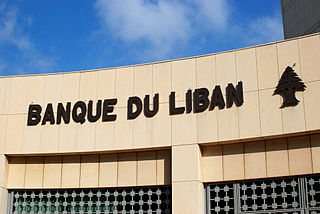
The Central Bank of Sri Lanka is the monetary authority and central bank of Sri Lanka. It was established in 1950 under the Monetary Law Act No.58 of 1949 (MLA), it is a semi-autonomous body, and following the amendments to the MLA in December 2002, is governed by a five-member Monetary Board, comprising the Governor as chairman, the Secretary to the Ministry of Finance and Planning, and three members appointed by the President of Sri Lanka, on the recommendation of the Minister of Finance, with the concurrence of the Constitutional Council.

The State Bank of Pakistan (SBP) is the Central Bank of Pakistan. Its Constitution, as originally laid down in the State Bank of Pakistan Order 1948, remained basically unchanged until 1 January 1974, when the bank was Nationalized and the scope of its functions was considerably enlarged. The State Bank of Pakistan Act 1956, with subsequent amendments, forms the basis of its operations today. The headquarters are located in the financial capital of the country in Karachi. The bank has a fully owned subsidiary with the name SBP Banking Services Corporation (SBP-BSC), the operational arm of the Central Bank with Branch Office in 16 cities across Pakistan, including the capital Islamabad and the four Provincial Capitals Lahore, Karachi, Peshawar, Quetta. The State Bank of Pakistan has other fully owned subsidiaries as well: National Institute of Banking and Finance, the training arm of the bank providing training to Commercial Banks, the Deposit Protection Corporation, and ownership of the Pakistan Security Printing Corporation.

Bangladesh Bank is the central bank of Bangladesh and is a member of the Asian Clearing Union. It is fully owned by the Government of Bangladesh.
Mick Thompson is an American banker and politician from Oklahoma who is serving as the State Banking Commissioner for the State of Oklahoma. Thompson was initially appointed by Governor of Oklahoma David Walters in 1992, and reappointed by Governor Frank Keating in 1996 and 2000. Governor Brad Henry reappointed Thompson in 2004 and 2008. In 2012, Thompson was reappointed by Governor Mary Fallin.
The Tennessee Department of Financial Institutions (TDFI) is a Cabinet-level agency within Tennessee state government, currently led by Greg Gonzales, Commissioner of Financial Institutions. The department is responsible for regulating Tennessee's banking system, including state-chartered banks and credit unions, and handling consumer complaints involving state regulated financial institutions. The department is divided into the Administrative/Legal Division, Bank Division, Compliance Division, Consumer Resources Division, and the Credit Union Division - each of which is led by an Assistant Commissioner.
The Tennessee Commissioner of Financial Institutions is the head of Tennessee's Department of Financial Institutions, which is responsible for regulating the bank system of that U.S. state. The Commissioner is appointed by the governor of Tennessee and is a member of the governor's Cabinet, which meets at least once per month, or more often to the governor's liking. Originally, a Banking Department had been created in 1913, led by a Superintendent of Banks, and then ten years later credit unions were added to the Department's responsibilities.

Banque du Liban is the central bank of Lebanon. It was established on August 1, 1963, and became fully operational on April 1, 1964. It is currently headed by Riad Salameh.

The Royal Monetary Authority of Bhutan is the central bank of Bhutan and is a member of the Asian Clearing Union. It is also the minting authority for the Bhutanese Ngultrum. The Royal Monetary Authority of Bhutan was established under the Royal Monetary Authority of Bhutan Act of 1982. Subsequently, the Act of 1982 was amended by the Financial Institutions Act of 1992 and replaced in its entirety by the Royal Monetary Authority Act of 2010.

The Central Bank of the United Arab Emirates is the state institution responsible for managing the currency, monetary policy and banking regulation in the United Arab Emirates.

The Oklahoma Department of Corrections is an agency of the state of Oklahoma. DOC is responsible for the administration of the state prison system. It has its headquarters in Oklahoma City, across the street from the headquarters of the Oklahoma Department of Public Safety. The Board of Corrections are appointees: five members are appointed by the Governor; two members are appointed by the President Pro Tempore of the Senate; and two members are appointed by the Speaker of the house of Representatives. The board is responsible for setting the policies of the Department, approving the annual budget request, and working with the Director of Corrections on material matters of the agency. T. Hastings Siegfried is the current chairman of the board. The director, who serves at the pleasure of the governor, is the chief executive of the department. The current director of Corrections is Scott Crow, who was appointed after Director Joe Allbaugh resigned his post on June 13, 2019. Crow was confirmed by the Oklahoma State Senate as director in May 2020.

The Oklahoma Department of Environmental Quality (DEQ) is a department of the government of Oklahoma under the Governor of Oklahoma. It is responsible for protecting human health and for safeguarding the natural environment: air, water, and land. DEQ is chiefly responsible for the environmental policy of Oklahoma. It is governed by a thirteen member Environmental Quality Board appointed by the Governor, which in turn appoints an Executive Director to administer the Department.
Bank regulation in the United States is highly fragmented compared with other G10 countries, where most countries have only one bank regulator. In the U.S., banking is regulated at both the federal and state level. Depending on the type of charter a banking organization has and on its organizational structure, it may be subject to numerous federal and state banking regulations. Apart from the bank regulatory agencies the U.S. maintains separate securities, commodities, and insurance regulatory agencies at the federal and state level, unlike Japan and the United Kingdom. Bank examiners are generally employed to supervise banks and to ensure compliance with regulations.
The New York State Banking Department was created by the New York Legislature on April 15, 1851, with a chief officer to be known as the Superintendent. The New York State Banking Department was the oldest bank regulatory agency in the United States.

The Oklahoma Department of Consumer Credit (ODCC) is an agency of the state of Oklahoma. The department regulates the consumer lending business in Oklahoma by overseeing non-commercial credit, small loans, installment sales and usury. The department also investigates and licenses creditors of the state.

The Oklahoma Department of Securities (ODS) is an agency of the state of Oklahoma. The department oversees the securities business in Oklahoma. The department regulates securities agents, broker-dealers, and investment advisers as well as the registration of stocks, bonds, and many other types of securities.

The Oklahoma Commissioners of the Land Office is an agency of the government of Oklahoma. The Land Office was created by the Oklahoma Constitution and is responsible for managing and controlling lands and funds granted to the state under the provisions of the Oklahoma Organic Act. These lands and fund are used to support common schools, colleges and universities. The Commissioners of the Land Office distributes over $125 million each year to K-12 schools and qualifying higher education institutions across the state.
The New Jersey Department of Banking and Insurance (DOBI) is one of 15 principal departments in New Jersey government. The department's mission is to regulate the banking, insurance and real estate industries in a professional and timely manner that protects and educates consumers and promotes the growth, financial stability and efficiency of these industries. The Commissioner of DOBI is Marlene Caride.

The California Department of Financial Protection and Innovation (DFPI), formerly the Department of Business Oversight (DBO), regulates a variety of financial services, businesses, products, and professionals. The department operates under the California Business, Consumer Services and Housing Agency.

The Wisconsin Department of Financial Institutions (DFI) is an agency of the Wisconsin state government responsible for state regulation of financial institutions and educating the public about financial issues.
The New Hampshire Banking Department is a state agency of the U.S. state of New Hampshire, headquartered in Concord. The department supervises all state-chartered financial institutions including commercial banks, merchant banks, and credit unions. As of June 2020, there were 61 charted institutions with a total of 329 branches in the state. The department has three divisions: Banking and Trust Division, Consumer Credit Division, and Office of the Legal Counsel.












